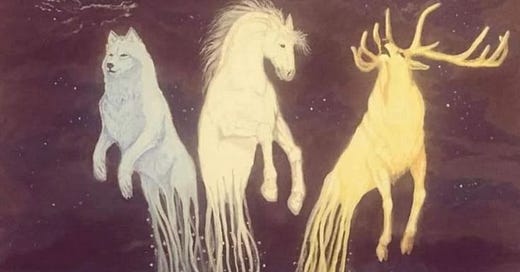I wonder what it’s like to be a prophet. There’s a difference, I think, between a prophet and a shaman. A shaman cultivates culture and narrative for a small tribe or group, while a prophet ushers in sweeping change—revolution on a global or civilizational scale.
But in the modern world, there doesn’t seem to be much room for either. There are tons of proto-shamans, but few real niches for them to mature into. It’s nearly impossible for a shamanic type to find meaningful work that doesn’t take away from their ability to explore and develop new narratives, new worldviews.
Most shamans gravitate toward some kind of creative pursuit—music, painting, poetry. Expressive work. But as we all know, the starving artist is a cliché for a reason. Many artists float by in college, maybe into their mid-20s or early 30s, but eventually they either have to sell out and get a more standard job, find a patron, or just go broke.
Getting a standard job is often seen as the “best” outcome. But it can also kill the soul for someone with a shamanic temperament. These folks don’t usually start to mature until their 30s—which I’ve written about elsewhere. But by the time you’re 30, if you’re still working retail or in dead-end gigs, it becomes much harder to break into a career. Not impossible—but way harder than just entering the professional world out of college. The trades are also brutal work for shamanic types, as I outlined here.
A patron can be great, in theory. But only if they're aligned with your vision. A misaligned patron can become a constraint, using their funding to steer or control your creative direction. And in an age where spiritual and philosophical beliefs are so fragmented and individualized, it's hard to find someone who shares enough of your worldview to back you meaningfully without trying to reshape you.
The other route—opting out entirely—is brutal. The “nomad artist” or semi-homeless lifestyle doesn’t give you the stability needed to do deep work. Some people pull it off, usually by being top-tier social engineers, trading charm and low-maintenance for couches and favors. You see this on Twitter sometimes—the dharma bro archetype. A few pull it off. But even those spots are mostly granted to people who display status-enhancing traits that please their in-group, not people doing serious, difficult, world-changing art.
Shaman vs. Prophet
So we circle back. Without a niche for shamans, many proto-shaman types try to become full-blown prophets. You see it in schizoid-adjacent types who feel destined to transform the nature of social reality. They focus on constructing a “theory of everything” or a world-shattering ideology—either to change the world or become famous enough to do so.
But most of them would probably be better off finding or forming a small community that could support them—and vice versa. The tragedy is, our culture doesn’t offer many ways to do that anymore.
The local priest or pastor used to serve that role. Different cultures had their own equivalents. But nowadays those paths are often tied up in rigid hierarchies or belief systems people find hard to stomach. Protestant churches, especially evangelical ones, are often extremely competitive—you need to be in the top 1% of charisma to succeed.
Becoming a therapist or spiritual coach is one of the more viable modern-day paths for shamanic types. And I think it's actually a good one. You can help others heal and still make money. But even therapists, due to the economy and the burnout loop, often don’t have time to reflect, create, or develop their deeper art.
Academia used to offer another option—a place where shaman-types could develop ideas in relative security. But with the rise of college loans, mass enrollment, and institutional collapse, that world is fading too.
I don’t have a great answer. I’m just thinking through where the proto-shaman fits in the modern world. And, to be honest, this is partially an exercise for myself. I’ve ended up in marketing—not ideal. I feel like I’m selling out my narrative intuition just to make a quick buck. Others have written about this tension—Visa, Rob Hardy, and more.
If you have thoughts on what a shamanic type can do in today’s world, drop a comment or write a note. I’d love to hear.





Carl Jung tried to reconfigure the role of a psychologist into that of a shaman. Channelers and spiritualists exist in the modern world too. There are lots of American method masters with aliases like "Dr Snake".
In fact, in the book 'Mules and Men', Zora Neale Hurston studied with lots of folk healers / method masters during the 30s, which is very recent. I recently posted about how people believe that you shouldn't slaughter a hog on the waning moon or it's meat will shrink in the pan, which seems like a shamanic idea.
Work from home is one of the best solutions for this type. I think you should expand on what you mean by shaman, though. Based on your brief definition, any job that doesn’t take all of your energy.
The trades and manufacturing can be great for that btw. Depends on what you do and how you do it. I read your piece on the trades and I think your field of vision is narrow. I’ve known people who have very simple jobs where they can meditate or listen to audiobooks all day, and make relatively decent money. No meetings, no emails. I used to do this myself and I pondered the mysteries of the world and consumed so many audiobooks that changed the trajectory of my life.
Everyone is different though, and we have to find our own way.